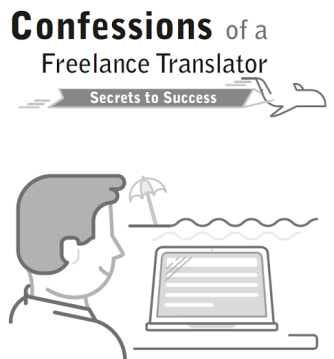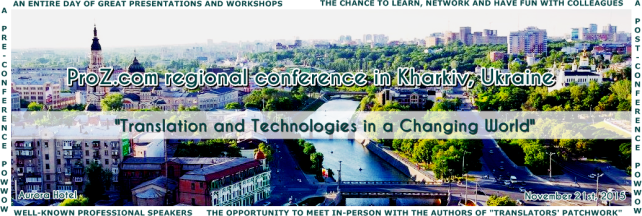“Welcome to one of the best jobs in the world!” screams the back cover of Gary Smith’s new book: Confessions of a Freelance Translator, Secrets To Success, a book offering practical, easily applicable tips to make a successful living out of freelance translation.
Gary Smith, a ProZ.com member, Certified PRO, trainer, event organizer and conference speaker, is an experienced proofreader and translator from Spanish and Catalan to English. A British native, he has lived in Spain for over two decades, offering webinars and talks internationally and around Spain.

Gary Smith, author of “Confessions of a Freelance Translator, Secrets To Success”
In today’s post, I had a chance to speak with Gary about Confessions of a Freelance Translator, Secrets To Success, the motivation behind the book, the process of writing it and the usefulness of the tips and tricks he provides throughout the book to translators starting out or who wish to make the leap to better earnings and work.
The interview
Me: What inspired you to write this book?
Gary: This is the kind of book I wish I’d had many years ago, so I could have avoided mistakes! Back then I would have loved this book with plenty of practical, applicable tips on freelance translation to start out or move up to higher earnings and productivity.
I think today in general there’s a generally positive attitude in the freelance translation community and a good example of that is Erik Hansson’s cathartic Facebook page “Things Translators Never Say” (TTNS) (voted winner of the ProZ.com Community Choice Award for best Facebook Page), which looks at frustrating situations with clients with humor and inspired this book’s title (there is a section in the book with funny situations with clients). It’s far better to laugh about such things with our colleagues around the world than to bang your head against the desk!
Even so, I felt there was a need for a book with this positive attitude that also gives a great deal of realistic, useful advice for translators about how to improve their situation. The Things Translators Never Say group gave me plenty of examples of typical problems faced by freelance translators, which helped me understand what they need and produce a book for them, all with a dash of of humour. And here it is!
Me: What was the hardest part of writing this book?
Gary: Strangely, the same kind of things we come across as translators, since translators themselves are writers! In other words: organisation, editing, revising, reviewing, proofreading, layout, design, etc. Then, as our translation clients sometimes do, I’d discover something new or realize I’d forgotten to mention something, so I’d have to add it in a logical, coherent way. Sometimes I thought I’d never finish it!
It’s taken about three years to write and I’ve used material from my own talks as well as studying successful small businesses and listening to advice from my experienced translation colleagues, of course.
Me: How much of the book is realistic? Are experiences based on someone you know, or events in your own professional life?
Gary: All of it! But the difference with this book is that there are lots of examples we can all relate to from service providers we come across in everyday life, using similar “tricks of the trade” that are in fact relevant to all professions and applying them to translation services to help attract and keep good clients.
There are also many examples from my own experience in the profession and from translators I have known over the years. Too many good translators are let down by a lack of simple, practical business nous that doesn’t seem to get taught enough in formal education. Whether we like it or not, most translators have to be freelancers and therefore entrepreneurs to a certain extent to make a good living.
Me: Is there a message in your book that you want readers to grasp?
Gary: Hmm…I’d say above all the message is that you can definitely make a good living out of translation by being a good professional and that the pros definitely outweigh the cons. It’s a great job if you get it right!
Me: Did you learn anything from writing your book? If so, what was it?
Gary: Well, as I’ve found when preparing my talks for congresses and webinars, when you want to teach something well and clearly you always end up fact-checking and learning something yourself, yes. I learned a lot from small business experts and even about sales psychology. And I also listened to some of my successful translation colleagues, of course! But with this book in particular, I observed service providers of all kinds, learning how they deal with their customers.
Me: Can we take a sneak peek at the book before its release?
 The book, through Gary: “…First, let’s put ourselves in our potential client’s shoes. The monolingual, monocultural client needs a text translated but knows nothing about translation, how to find a good translator, or how much they may reasonably charge. Their idea of a human translator may be a studious hermit sitting at a desk piled with paper dictionaries, holding a quill poised in the air as they muse over a mixed metaphor. On the other hand, the only translator everybody in the developed world has heard of is Google Translate. Everybody has used the famous word cruncher once in a while to see what their Chinese tattoo actually means or get the gist of a foreign news article or recipe. So our potential client knows of Google Translate at least. They also know it is capable of translating thousands of words per second for free. And then they turn to you and discover that it will take days and cost several hundreds or thousands of euros. Understandably, they may well be taken aback.
The book, through Gary: “…First, let’s put ourselves in our potential client’s shoes. The monolingual, monocultural client needs a text translated but knows nothing about translation, how to find a good translator, or how much they may reasonably charge. Their idea of a human translator may be a studious hermit sitting at a desk piled with paper dictionaries, holding a quill poised in the air as they muse over a mixed metaphor. On the other hand, the only translator everybody in the developed world has heard of is Google Translate. Everybody has used the famous word cruncher once in a while to see what their Chinese tattoo actually means or get the gist of a foreign news article or recipe. So our potential client knows of Google Translate at least. They also know it is capable of translating thousands of words per second for free. And then they turn to you and discover that it will take days and cost several hundreds or thousands of euros. Understandably, they may well be taken aback.
To understand their predicament, imagine your car breaks down in a town you don’t know and you have to find a decent mechanic to repair it. At one garage they nonchalantly tell you it’s going to cost € 50 and take half an hour. At another, they shake their heads sagely and tell you it’ll cost € 1,000 and take a week. Who’s telling the truth? Who knows what they’re doing? Who’s trying to rip you off? In order to gain a potential client’s confidence, there are little strategies that mechanics and other service providers from lawyers to doctors can and do use to allay our fears and convince us to choose their services. We, too, can apply such strategies to gain our clients’ trust. We shall look at them throughout this book.”
Me: When will the book be released and how will readers be able to purchase it?
Gary: The book will be made available any time now at Lulu.com.
The book
Confessions of a Freelance Translator is divided into easily digestible sections relating to: finding, keeping and dealing with clients, setting fees, visibility, guiding the client through the translation process, freelance organisation in general, specialisation with some useful tips on scientific and technical translation, a general discussion of hot topics (e.g. machine and crowd translation), some tips on small interpreting jobs and of course some hilarious examples of confessions of a freelance translator!
Get this book →
 Since its release in June 2016, ProZ.com Mobile –a native app developed by ProZ.com for use on mobile devices– has been widely used by freelance language professionals to browse jobs, submit job quotes, search for translated terms, participate in KudoZ, polls and forums directly from their phones and tablets.
Since its release in June 2016, ProZ.com Mobile –a native app developed by ProZ.com for use on mobile devices– has been widely used by freelance language professionals to browse jobs, submit job quotes, search for translated terms, participate in KudoZ, polls and forums directly from their phones and tablets.






